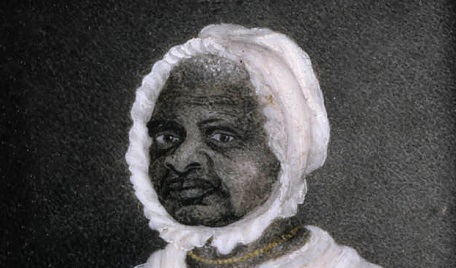Almost a decade before the U.S. Constitution was signed into law, the first African American woman to successfully file a lawsuit for her freedom won in the state of Massachusetts.
 On August 22, 1781, a jury in Great Barrington, Massachusetts found that an African American woman named Elizabeth Freeman should be freed and was not the legal property of Colonel John Ashley. By winning, Freeman, also known as “Mum Bett,” became the first African American woman to successfully file a lawsuit for her freedom in the state of Massachusetts.
On August 22, 1781, a jury in Great Barrington, Massachusetts found that an African American woman named Elizabeth Freeman should be freed and was not the legal property of Colonel John Ashley. By winning, Freeman, also known as “Mum Bett,” became the first African American woman to successfully file a lawsuit for her freedom in the state of Massachusetts.
The case, Brom and Bett v. Ashley, was argued in court on August 21, 1781. The jury only took one day to reach its verdict. However, it took Mum Bett at least 30 years to be able to fight for her freedom in court that day.
Mum Bett—who, after gaining freedom, changed her legal name to Elizabeth Freeman—became a slave in the household of Colonel Ashley and his wife, a wealthy and prominent western Massachusetts family, sometime in the 1740s. It is reported that Mrs. Ashley was not kind to her slaves. Once, in a particularly brutal moment, Mrs. Ashley went to strike another slave (possibly the sister or daughter of Mum Bett) with a hot shovel, and Mum Bett blocked the blow, leaving her with a scar. While in the Ashley home, Mum Bett left her scar exposed as evidence of her abuse.
Colonel Ashley served as a judge of the Berkshire Court of Common Pleas. In January 1773, Ashley moderated the local committee that wrote the Sheffield Declaration. Also known as the Sheffield Resolve, the Declaration was a petition against British tyranny, as well as a manifesto for individual rights of American colonists. In particular, it declared that “mankind in a state of nature are equal, free, and independent of each other, and have a right to the undisturbed enjoyment of their lives, their liberty and property.” Notably, this language was to be found again in the Declaration of Independence of 1776 and in the Massachusetts Constitution of 1780.
At some point, Mum Bett overheard Colonel Ashley and his dinner guests “talking over the Bill of Rights… that all people were born free and equal.” Mum Bett recognized that the principles of liberty and equality the men discussed could also apply to her. From that moment, she resolved to gain her freedom.
To help her in her pursuit of freedom, Mum Bett sought out the aid of Theodore Sedgewick, a lawyer in the neighboring town of Stockbridge, who supported the anti-slavery cause. Sedgewick later described Mum Bett bringing her case to him on the grounds of the newly ratified Massachusetts Constitution.
Mum Bett was joined in her freedom suit by another enslaved man, Brom, who was also the property of Colonel Ashley. Sedgewick brought the case to the Berkshire Court of Common Pleas in May 1781.
Prior to 1780, there had been about 30 freedom suits brought forward in which slaves sought freedom from their masters on legal technicalities, such as a mother's slave status (if unclear). In the case of Mum Bett and Brom, however, Sedgewick took the case to court on constitutional grounds, arguing that due to the Massachusetts Constitution’s language on equality, slavery was outlawed in the state and Mum Bett and Brom were not Ashley's legitimate property. The case was widely considered to be a “test case,” as lawyers on both sides of the issue were keen to see how a court would interpret the new Massachusetts Constitution in light of Sedgewick’s request for the freedom of Mum Bett and Brom from slavery.
Sedgewick obtained a writ of replevin from the court, an action for the recovery of property. The writ ordered Colonel Ashley to release Mum Bett and Brom because they were not his legitimate property. The Colonel refused to do so.
By August 1781, Colonel Ashley still refused to release Mum Bett and Brom from his ownership. Their case was advanced to the County Court of Common Pleas of Great Barrington, where Sedgewick argued before the court that the Massachusetts Constitution outlawed slavery. On August 22, 1781, the jury agreed, declaring Mum Bett and Brom to be free people. The court granted them 30 shillings each.
As a free woman, Mum Bett changed her name to Elizabeth Freeman. Despite repeated requests to return to work for Colonel Ashley, Elizabeth became a paid domestic worker in the home of Theodore Sedgewick. She also became widely known in the area for her skills as a healer, midwife, and nurse. Elizabeth eventually bought her own house, where she lived alongside her children. She died on December 28, 1829 and was buried in the Sedgewick family plot. Her gravestone includes the words: "She was born a slave and remained a slave for nearly thirty years. She could neither read nor write, yet in her own sphere she had no superior or equal."
Elizabeth’s successful case for her own freedom was the first won by an African American woman in the state of Massachusetts. The case also launched the beginning of three freedom suits, known collectively as the Quock Walker case. Though historians debate the extent of the role that this trio of cases played in the cause of ending slavery, they represented a significant step towards it—a step ultimately resulting in the declaration by Supreme Court Chief Justice William Cushing that the institution of slavery was incompatible with the principles of liberty and legal equality articulated in the new Massachusetts Constitution.
Slavery was outlawed in the state of Massachusetts in 1783.
Sources:
https://www.massmoments.org/moment-details/jury-decides-in-favor-of-elizabeth-mum-bett-freeman.html
https://www.womenshistory.org/education-resources/biographies/elizabeth-freeman
https://www.elizabethfreemancenter.org/who-we-are/elizabeth-freeman/
Alexandra “Mac” Taylor is a Content Fellow for the National Constitution Center.







